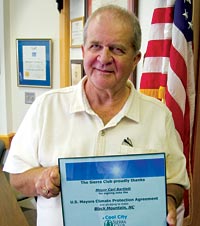Black Mountain and Clyde are officially “cool”
“Black Mountain is leading the way,” Tom Jensen proclaimed during a Sept. 4 ceremony at the Town Hall. Not wanting to sound insincere, he added, “I’m dead serious. … Folks out here have an amazing amount of vision and common sense.”

Jensen, who directs the North Carolina arm of the Sierra Club’s Cool Cities program, had traveled from Raleigh to Black Mountain to declare it an official Cool City. To gain the designation, a city’s mayor signs onto the U.S. Mayors’ Climate Protection Agreement, a national initiative that seeks to address climate change at the local level. For many cities, signing that agreement marks the first step. But Black Mountain had a strong environmental commitment long before Mayor Carl Bartlett had even heard of the Cool Cities program.
The town has committed to using a B20 biodiesel blend for most of its diesel vehicles, strengthening its greenway system, buying an electric vehicle for its Police Department, and enacting strict storm-water regulations. Black Mountain has also hosted a series of green-building workshops, conducted energy audits of town facilities to curb electricity consumption, and begun offering rebates of inspection fees for houses certified under the statewide HealthyBuilt Homes Program.
“Does this mean I am officially a cool mayor?” Mayor Bartlett asked lightheartedly when Jensen presented him with a plaque during the ceremony. Jensen, of course, said it did.
The following day, Jensen bestowed similar honors on another local municipality: Clyde. And nearby Canton also joined several months ago. Of the 23 Cool Cities in North Carolina, 10 are in the western region, Jensen told Xpress. Asheville is one of them.
The program aims to encourage local governments to commit to the measures called for by the Kyoto Protocol, even though the federal government has never signed it. Participating mayors agree to work toward bringing their cities’ greenhouse-gas emissions down to 7 percent below 1990 levels by 2012. Although the Sierra Club doesn’t monitor compliance, the agreement is designed to get local municipalities engaged despite the lack of federal leadership on the issue. “Unfortunately, our country is so behind the curve with addressing global warming,” notes Jensen. “So we’re starting with modest goals, and we’re hoping it will get more aggressive as time goes on.”
Residents pressure for cleanup action on CTS site
Two months ago, Xpress ran a story about CTS of Asheville, a former electroplating facility on Mills Gap Road that left toxic contamination in the soil and ground water after closing in the mid-‘80s. (See “Fail-Safe?”, July 11 Xpress.) High concentrations of the primary contaminant, a suspected carcinogen called trichloroethylene, remain in the ground water despite the involvement of the U.S. Environmental Protection Agency, which detected significant contamination in a neighbor’s drinking-water supply in 1999.
During the public-comment portion of the Buncombe County Board of Commissioners’ Sept. 4 meeting, Barry Durand—who brought the issue to Xpress’ attention last spring—gave a three-minute science lesson. To illustrate how the toxic chemical behaves in the environment, he displayed a bottle of Poland Spring water that had been mixed with trichloroethylene and a substance that dyes the chemical pink. Noting that the pink stuff had all settled at the bottom, Durand explained that no real effort has been made to remove the bottom layer of contamination that exists in the groundwater at the CTS site. “I told them that this is an opportunity for action,” Durand said later. “A lot of good can still be done; I asked them to please take leadership.” Meanwhile, Robert and Judy Selz, who live near the former CTS plant, are preparing to launch a petition drive demanding a complete and rapid cleanup of the site.
Asked about the issue, county Health Director Vicky Ittel said, “We have been in contact with the state to see if they have done more recent sampling.” Ittel added that she’s working with EPA staffer David Dorian to request that the Agency for Toxic Substances and Disease Registry—a federal public-health agency—conduct a study of the site. A previous ATSDR visit, she noted, yielded no results, as no written report was ever filed.



Before you comment
The comments section is here to provide a platform for civil dialogue on the issues we face together as a local community. Xpress is committed to offering this platform for all voices, but when the tone of the discussion gets nasty or strays off topic, we believe many people choose not to participate. Xpress editors are determined to moderate comments to ensure a constructive interchange is maintained. All comments judged not to be in keeping with the spirit of civil discourse will be removed and repeat violators will be banned. See here for our terms of service. Thank you for being part of this effort to promote respectful discussion.